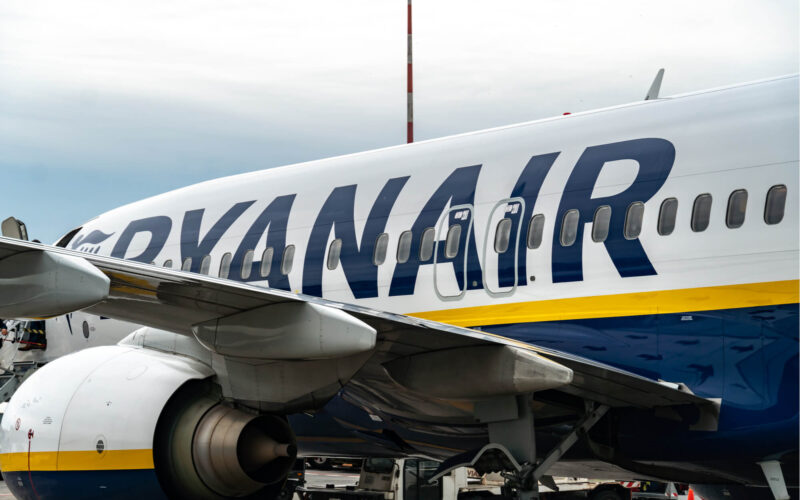Ryanair wants to be the first airline to return to Ukraine when possible and is even helping out by loading supplies into the bellies of its aircraft, the first time in 30 years it has transported cargo.
Speaking at a press conference in London on March 2, 2022, Michael O’Leary, CEO of Ryanair, said that as soon as it is safe to return, the low-cost carrier is determined to return to the eastern European country.
“We will be the first airline to return to flying to Ukraine when it is safe to do so, when we’re allowed by the European Safety Agency… But I suspect it will take probably till summer, and maybe into next winter… when hopefully the Ukrainians will have seen off the Russians and sent them back to where they came from”, he stated.
Prior to the Russian invasion of Ukraine last week, Ryanair was one of the largest airlines flying in and out of the country.
According to data from IBA, Ryanair was the second largest airline in the Ukrainian market with a market share of 12.3% in February 2022, while Wizz Air was ranked fourth with 9.6%. However, Ukraine only represents 2% and 4% respectively of their total flights, IBA noted.
As O’Leary pointed out, the dangers associated with warzones, airspace closures and Russian efforts to destroy airport-based navigation aids and radar systems have now made it impossible for carriers to fly in and out of the country.
To support the Ukrainian people during the ongoing crisis, the Irish CEO also said that Ryanair has begun transporting medical supplies and humanitarian aid from the UK and Ireland to Polish airports, including Rzeszow, Warsaw and Krakow.
“The Poles have been phenomenal in the whole Ukrainian crisis. The Polish airports, the Polish military are willing to take all those humanitarian supplies straight off the belly of the aircraft and straight to the Ukrainian border”, he commented.
O’Leary noted that this is the first time in around 30 years that Ryanair has transported cargo.
Competitor Wizz Air announced earlier on March 2, 2022 that it is providing 100,000 free seats for Ukrainian refugees on short-haul flights departing from Poland, Slovakia, Hungary, and Romania in March 2022.
O’Leary said bookings dropped 10-20% in the days immediately after Russia invaded Ukraine.
However, he said Ryanair had noticed a surge in bookings to and from Poland, as Ukrainian families that had successfully crossed the border sought to reunite.
Before the crisis, Ryanair was expecting to fly 2 million passengers in and out of Ukraine this financial year. However, O’Leary says Ryanair, which had no aircraft based in Ukraine, will redistribute the capacity elsewhere, meaning the loss of Ukrainian traffic will have a limited impact on overall passenger numbers.
Summer travel demand
O’Leary was speaking at an event to announce the carrier’s largest ever summer schedule from London airports, including 14 new routes from Gatwick, Luton and Stansted.
Speaking on the wider impact of the crisis on the airline and the aviation industry’s recovery from COVID-19, O’Leary pointed to Ryanair’s “somewhat fortuitous fuel hedging strategy”, which will help insulate it, at least initially, from the “steep and severe” impact on fuel prices.
The Irish ultra-low-cost carrier is 80% hedged until March 2023 at $63 a barrel, while the market price of a barrel of crude oil has been hovering around $100 since the latter half of last week. For non-hedged fuel, it expects to have to pay an extra $50 million over the next 12 months.
O’Leary noted that some other airlines, such as Wizz Air, have not pursued a hedging strategy, leaving them more vulnerable to fluctuations in oil prices.
“Because we have lower costs than every other airline… we’ve done better during periods with rising oil prices. What happens is the airlines who have no margins, like Lufthansa (LHAB) (LHA), Air France, BA, put fuel surcharges on the short-haul flights. Fares rise”, he commented, referencing previous crises such as the Gulf War and post-September 11 period.
Barring an escalation of the war, O’Leary said he still expects Europeans to travel internationally this spring and summer despite rising living costs and the violence in Ukraine.
Speaking specifically on UK and Irish demand for leisure travel, he said: “There is huge pent-up demand. Easter looks very strong at the moment.”
In January 2022, Ryanair said it was expecting a net loss of between €250 million to €450 million for its financial year to March 31, 2022 and to carry just under 100 million passengers. O’Leary predicted a loss in the middle of that guidance range and said passenger numbers will likely be between 95 million and 98 million for the full year.
On aircraft orders, O’Leary reiterated that no new discussions were taking place with Boeing. Talks between the two companies on a potential new order of 737 MAX aircraft ended in 2021 over pricing differences.

